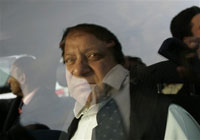Lawyers in Pakistan protest against illegal deportation of Nawaz Sharif
Pakistan's lawyers are going to boycott courts across Pakistan on Tuesday to protest the deportation of former Prime Minister Nawaz Sharif in defiance of a Supreme Court ruling saying he had the right to return home, organizers said.

President Gen. Pervez Musharraf sent Sharif, the premier he ousted in a 1999 coup, back into exile in Saudi Arabia on Monday, hours after the opposition leader landed on a flight from London hoping to lead a campaign against military rule. He was charged with corruption and money-laundering before leaving.
His deportation came despite a Supreme Court ruling last month that Sharif had the right to stay in Pakistan. The court has emerged as a check on Musharraf's dominance since his failed attempt to sack the country's top judge earlier this year that sparked a nationwide protest movement.
Sharif's party - which struggled to mobilize supporters Monday amid widespread arrests - said it had no immediate plans to launch fresh protests Tuesday.
But Ali Ahmed Kurd, a senior member of the Pakistan Bar Council, said lawyers across the country are boycotting court proceedings to protest Sharif's deportation.
"The government intentionally and willfully violated the Aug. 23 ruling of the Supreme Court," he said. "The government wants to curb the independence of the court that it achieved through the lawyers' movement ... We should back the independence of the judiciary."
Deputy Information Minister Tariq Azim told the British Broadcasting Corp. on Monday that Musharraf's government obeyed the Supreme Court ruling to let Sharif enter the country, but that the former premier chose to go back into exile to avoid facing trial.
Sharif was originally exiled in 2000 following the coup. Accused of denying landing rights to a plane carrying Musharraf that was short on fuel, Sharif was jailed but later released and sent to Saudi Arabia after allegedly pledging not to return for a decade.
"It was a choice given to him that either he goes to a detention center and be detained and tried, or he goes and completes his 10-year (exile) agreement that he has signed with the Saudi government," Azim told the BBC.
"No hindrance or obstacle was placed upon his entry into Pakistan," Azim said.
Sadiq ul-Farooq of Sharif's Pakistan Muslim League-N party called the government's claim that Sharif chose to go back into exile a "baseless concoction" and that he had volunteered to be arrested by police at Islamabad airport after he was served a warrant.
"He (Sharif) said, 'If you have any cases against me, arrest me and send me to jail.' He offered his wrists to them," ul-Farooq said.
He estimated that more than 5,000 Sharif party workers and leaders have been arrested nationwide in recent days, including the party's chairman and former Pakistan President Rafiq Tarar. Authorities have confirmed that hundreds were rounded up ahead of Sharif's return.
His deportation also drew immediate criticism from the European Union, which noting the Supreme Court ruling denying authorities the right to block the return of Sharif, who was twice elected prime minister in the 1990s.
The United States, which has valued Musharraf as an anti-terror ally since the 9/11 attacks and rarely presses him on his lackluster democracy record, gave a more guarded reaction.
State Department spokesman Sean McCormack said the deportation "runs contrary to the Supreme Court decision," but would not comment further because the matter was "still under legal consideration."
Analysts say the move will deepen the general's unpopularity in Pakistan and could undermine the legitimacy of upcoming elections.
"Musharraf has probably taken a decision to twist any law to do what he can do to stay in power. This is the politics of survival," Rasul Bakhsh Rais, a political scientist at Lahore University of Management Sciences.
Subscribe to Pravda.Ru Telegram channel, Facebook, RSS!


